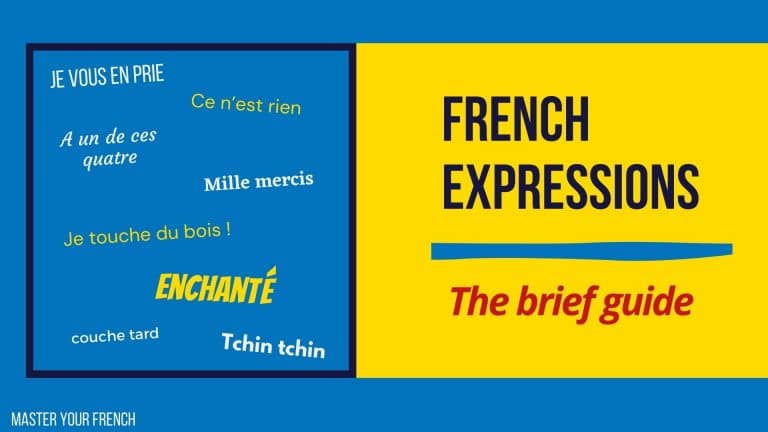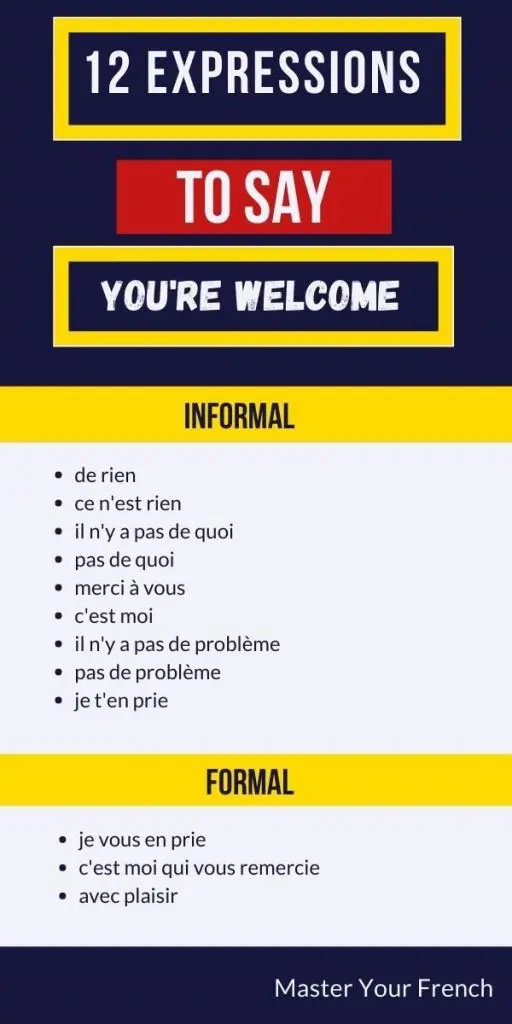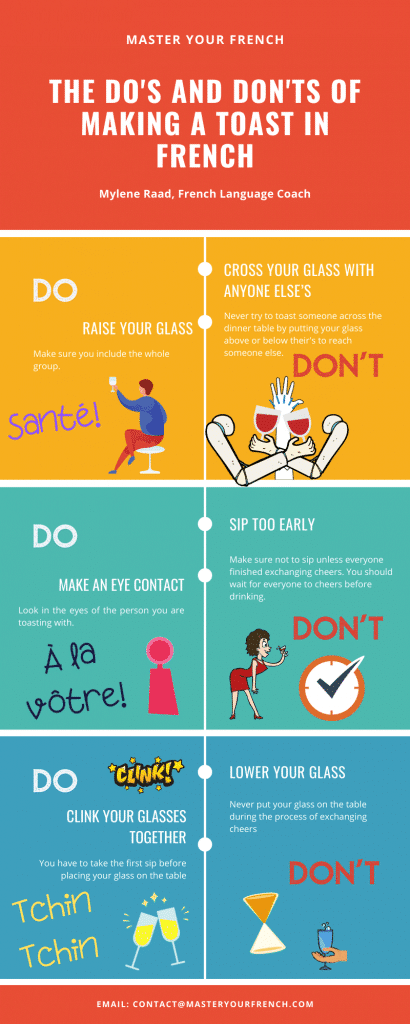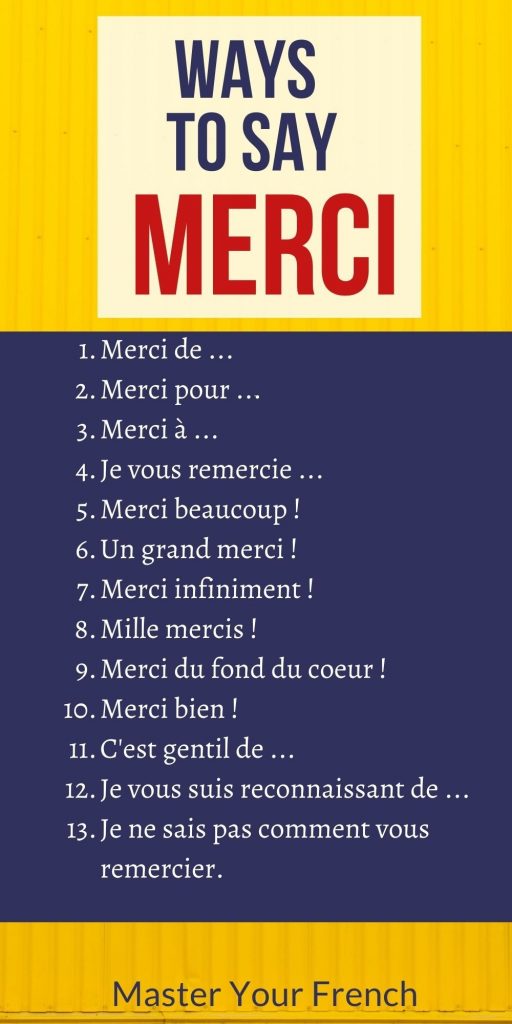The brief guide to common French expressions
Updated: 14 March, 2021 by Mylene in French Expressions ▪

You learned French: at school, online or at home with books and audio. But have you learned the French which is really spoken in everyday life?
To be sure, I suggest you discover below the expressions used in everyday life in France. You can also join the online course of Master Your French to help you boost your French listening.
In this guide, we’ll cover the following expressions:
- You’re welcome in French
- Cheers in French
- Nice to Meet you in French
- Good luck in French
- Goodbye in French
- Goodnight in French
- Thank you in French
- Useful French expressions
How to say you’re welcome in French?
The most common way of saying you’re welcome in French is de rien. In our daily conversations and our day-to-day life, we encounter situations where a polite reply is needed. For example, when someone thanks you, what would you answer? Or when someone says thank you for holding a door open, what would you answer?
You only have a few seconds to answer. And you have to reply with the appropriate form of “you’re welcome”.
In French, a common reply to “thank you” is “de rien”. However, there are numerous ways of saying you’re welcome in French.
As depicted in the image, these are 12 different expressions to say you’re welcome in French.
- De rien
- Ce n’est rien
- Il n’y a pas de quoi
- Y’a pas de quoi
- Il n’y a pas de problème
- Pas de problème
- Je vous en prie
- Je t’en prie
- Avec plaisir
- C’est moi qui vous remercie
- C’est moi
- Merci à vous
As I explain, you can substitute the use of you’re welcome with other terms that suit better the situation. You can find all the details about when to say “you’re welcome” and how to use its variants in the main article you’re welcome in French.

How to say cheers in French?
Wondering how to say Cheers in French? You can say “Santé” which translates to “to your health”. A more polite way is to say “À votre santé!”, which is another common way to say cheers in French.
Now that you know that santé is the cheers in French, let’s go a step further in the French tradition and explain everything surrounding this clinking-glass ceremony. Check the infographic below.
These are 8 different expressions to say your cheers in French:
- À votre santé: it’s a polite generic toast that translates to “To your health” and is often used in plural/formal contexts
- A ta santé: is a generic toast commonly used in singular/informal situations.
- Santé: it’s a very common generic toast
- A la vôtre: is also an expression that translates to “to yours” where the word health is assumed.
- A la tienne: similar to “à la vôtre” but is often used in an informal/singular context
- A la nôtre: similar to à la vôtre but refer to us (to ours)
- Trinquons: this expression means to clink glasses together
- Tchin-tchin (chin chin): very familiar expression
Cheers in French: the do’s and don’ts
Again, there are dos and don’ts when it comes to how you make a toast in French. They are summarized in the infographic below.

How to say nice to meet you in French?
Nice to meet you is a useful expression, no matter the language. In France, it is essential to learn greetings as it plays an important role in the interpersonal relationships of the French culture.
Whether a professional or a personal introduction, it is important to know what to say, and how to think and act. In reality, introductions are the first step of befriending a new person.
In many contexts, you’d be glad to know the expression. For instance, when traveling to a foreign country, when writing an email, when studying abroad, etc.
I’ll present the many ways of saying nice to meet you, as well as the details when each expression is most suitable to use when speaking French.
Below is a list of diverse ways to say nice to meet you in the French Language. Use these phrases when you meet someone for the first time:
- The Casual Nice To Meet You In French: Enchanté(e)
- The Formal Nice To Meet You In French: Ravi(e) de te/vous rencontrer
- The Pleased To Meet You In French: C’est un plaisir de te/vous rencontrer
- The French Nice To Meet You With A Compliment: On m’a beaucoup parlé de vous
You can learn other ways of saying nice to meet you in French, or nice to e-meet you, in our article dedicated to this topic: How does a French say nice to meet you?
How to say goodbye in French?
Au revoir is the right way to say goodbye in French. Some alternative terms to say “au revoir” in French also exist.
- A demain
- À tout
- À un de ces quatre
- À plus
- Adieu
- Salut
- À demain
- À tout à l’heure
- À la semaine prochaine
- À bientôt
- À plus tard
The word plus in French has multiple pronunciations. It is essential to learn these variations to properly understand and communicate in French. Additionally, the word tout can be pronounced in different ways depending on the context. Being aware of these pronunciation differences for tout is also important for mastering French.
How to say good luck in French?
Definitely, luck plays a vital role in our lives. Wishing good luck is useful in different situations. There are expressions that are best to wish good luck in a formal way, others are totally informal ways and are used only with close friends and family members.
Sometimes, good luck includes a festive message. Other times, good luck is more about effort and less about chance. In addition, in French, there are different nuances of luck.
There are also some expressions – some of them are also found in English – that are related to superstitions, such as “je touche du bois” (knock on wood).
Of course, the most common way to wish Good luck in French is “Bonne chance”. This French two-words expression can be literally translated to English: “bonne” means good and “chance” means luck.
However, there are dozens of ways to say Good Luck in French and some of these expressions might sound weird.
- Bonne chance pour ton entretien: Good luck for your job interview:
- Je vous souhaite bonne chance: I wish you good luck
- Que votre séjour soit agréable: May your stay be pleasant
- Meilleurs voeux pour votre mariage: Best wishes for your wedding
- Je te dis merde pour ton concours demain: Good luck in the contest tomorrow
- Je croise les doigts pour que ton examen se passe bien: I’m crossing my fingers for your exam to go well
- Mon projet avance super bien, je touche du bois: My project is going very well, knock on wood
- Bon courage pour votre trajet: Good luck for your journey
- Les enfants doivent dormir d’ici une heure, bonne chance pour les coucher!: The kids must go to sleep an hour from now, good luck in putting them to bed!
Besides these 9 ways expressions, you can find additional ways to say good luck in French in this article 20 Expressions to Wish Good Luck in French. You’ll find the right situations in which every expression is appropriate.
How to say good night in French?
Saying good night is a common way to wish a peaceful sleep to a friend, a family member, or just someone you met outside. There are several distinct ways to say good night in French. Each expression has a unique meaning that defines when it’s appropriate to say it, with whom, and how?
This article explains how to wish good night and its best alternatives in French. You will learn among others:
- How to say good night in French?
- The difference between bonne nuit and bonsoir
- How to say I’m going to sleep in French?
- How to say have a good night for children?
- How to say I’m going to bed in French?
- How to say a night owl in French?
- What to respond to a good night?
- Expressions with words sommeil and dormir
- Sleep-related french expressions

How to say thank you in French?
Saying thank you is by no means a perfect way that people around the world to express their gratitude. There are many ways to express gratitude in different cultures and in different languages.
Likewise, there are numerous ways to say thank you in French, from a simple merci, or thank you, to an ultra-polite expression of appreciation.
In the article The Best Ways to Say Thank You in French, you’ll discover the many ways of saying thank you in French:
- The difference between merci de, merci à and merci pour
- C’est gentil de ta part (informal).
- Je ne sais pas comment vous remercier.
- Je vous suis extrêmement reconnaissant.
- Merci beaucoup.
- Un grand merci.
- Merci infiniment.
- Mille mercis.
- Merci du fond du coeur.
- Merci bien.
- Je vous remercie pour votre compréhension.
- Je vous remercie de tout coeur.

Useful French Expressions
Idioms are essential for understanding and for speaking a language like a native. There are hundreds of useful expressions in French that you need to know in order to better understand native speakers. Let’s discover 10 Useful French Expressions And Their Meanings:
- être au courant
- chercher midi à 14 heures
- ça fait un bail
- avoir un coup de barre
- donner un coup de main
- gagner sa vie
- chapeau!
- être en train de
- ça marche!
- (jeter) un coup d’oeil
You can also learn the right ways of using the subordinating conjunction à moins que in French.
Beyond common French expressions
With Master Your French, learn the different ways of saying you’re welcome in French and nice to meet you in French. You’ll also learn how to avoid embarrassing mistakes when saying good luck in French. These articles will have you clinking glasses like a French in no time.
You can watch more French videos that I publish. Subscribe to my YouTube channel and follow me on Instagram!

